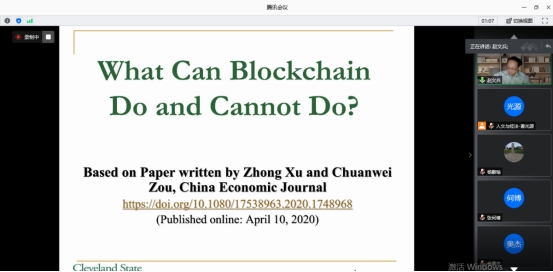The School of Humanities, Economics and Laws actively responded to the call of the "Online Summer International course" from the International Cooperation Office of Northwestern Polytechnical University. In order to enhance the school’s international schooling capabilities, effectively promote the international development of students, and create a good atmosphere for international communication. Professor Wenbing Zhao of Electrical and Computer Engineering department from Cleveland State University in the United States was invited to give the online lecture: "Blockchains: Principles and Applications".

At present, China has positioned the development of blockchain as a national strategy, and blockchain technology will play an important role in the fundamental areas of people's livelihood such as finance, Internet of Things and logistics, public services, digital copyright, insurance, and public welfare. The application of blockchain in public affairs will help to better promote the efficiency and precision of public management, but it will also be accompanied by safety supervision risks. This course attracted many undergraduate and master students from the School of Humanities, Economics and Laws, the School of Management, the School of Education and Experiment, and the School of Aviation to participate in the course. Professor Zhou Jiong from the School of Humanities, Economics and Laws participated in classroom as the course assistant.
The course introduced the basic knowledge and skills of blockchain technology, so that students can deeply understand the origin, development and application requirements of blockchain, master the basic principles and practical applications of blockchain cryptography, consensus mechanism, etc., and learn to use "Chain Thinking" analyzes and design applications in various industries. The lecture was mainly based on online interactive teaching. Professor Wenbing Zhao first gave a introduction of the topic and later discussed, analyzed and summarized the questions raised by the students. At the end of the course, students of each study group combined their own majors and interests to make a presentation accompanied with slides on the research of blockchain in energy supply, financial supervision ,legal application and so on.
The content of the eleven-day course is detailed, and the students have gained a lot. The following are some of the students' learning experience:
After eleven days of courses, I learned about the current scientific principles and applications of blockchain in the patient teaching of Mr. Zhao. The research and study during and after class also specifically made me perceive the call for the rule of law in the era of rapid development, and made me have more understanding of the current situation .——Jiang Junfeng, School of Humanities, Economics and Law
The content of this blockchain technology and application course is rich, from the origin of blockchain to its development, from theoretical meaning to practical application. There are many introductions, so that I have a general understanding of the emerging technology of blockchain. ——Li Ziqi, Education Experimental College
Professor Zhao worked very hard and he made an ideal educational environment for all his students, that he took the effort of teaching both in English and Chinese. I did acquire knowledge from professor Zhao's class, and thanks to him for making everyone feel comfortable in his class.-Aviation Academy MULANGU JOHN
The School of Humanities, Economics and Laws will continue to invite international renowned scholars to give lectures and to cultivate talents with global vision and cross-cultural communication skills.
School of Humanities, Economics and Laws
(Author/曹光源 黄逸莹 Review/张清江 )